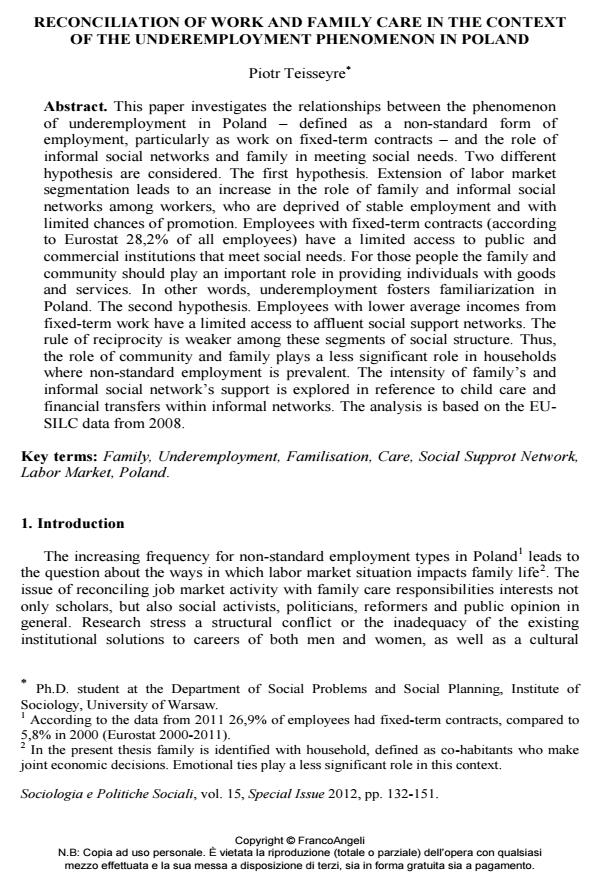Reconciliation of work and family care in the context of the underemployment phenomenon in Poland
Titolo Rivista SOCIOLOGIA E POLITICHE SOCIALI
Autori/Curatori Piotr Teisseyre
Anno di pubblicazione 2013 Fascicolo 2012/Suppl. 3
Lingua Inglese Numero pagine 20 P. 132-151 Dimensione file 358 KB
DOI 10.3280/SP2012-SU3007
Il DOI è il codice a barre della proprietà intellettuale: per saperne di più
clicca qui
Qui sotto puoi vedere in anteprima la prima pagina di questo articolo.
Se questo articolo ti interessa, lo puoi acquistare (e scaricare in formato pdf) seguendo le facili indicazioni per acquistare il download credit. Acquista Download Credits per scaricare questo Articolo in formato PDF

FrancoAngeli è membro della Publishers International Linking Association, Inc (PILA), associazione indipendente e non profit per facilitare (attraverso i servizi tecnologici implementati da CrossRef.org) l’accesso degli studiosi ai contenuti digitali nelle pubblicazioni professionali e scientifiche.
This paper investigates the relationships between the phenomenon of underemployment in Poland - defined as a non-standard form of employment, particularly as work on fixed-term contracts - and the role of informal social networks and family in meeting social needs. Two different hypothesis are considered. The first hypothesis. Extension of labor market segmentation leads to an increase in the role of family and informal social networks among workers, who are deprived of stable employment and with limited chances of promotion. Employees with fixed-term contracts (according to Eurostat 28,2% of all employees) have a limited access to public and commercial institutions that meet social needs. For those people the family and community should play an important role in providing individuals with goods and services. In other words, underemployment fosters familiarization in Poland. The second hypothesis. Employees with lower average incomes from fixed-term work have a limited access to affluent social support networks. The rule of reciprocity is weaker among these segments of social structure. Thus, the role of community and family plays a less significant role in households where non-standard employment is prevalent. The intensity of family’s and informal social network’s support is explored in reference to child care and financial transfers within informal networks. The analysis is based on the EUSILC data from 2008.
Parole chiave:Family, Underemployment, Familisation, Care, Social Supprot Network, Labor Market, Poland
Piotr Teisseyre, Reconciliation of work and family care in the context of the underemployment phenomenon in Poland in "SOCIOLOGIA E POLITICHE SOCIALI" Suppl. 3/2012, pp 132-151, DOI: 10.3280/SP2012-SU3007